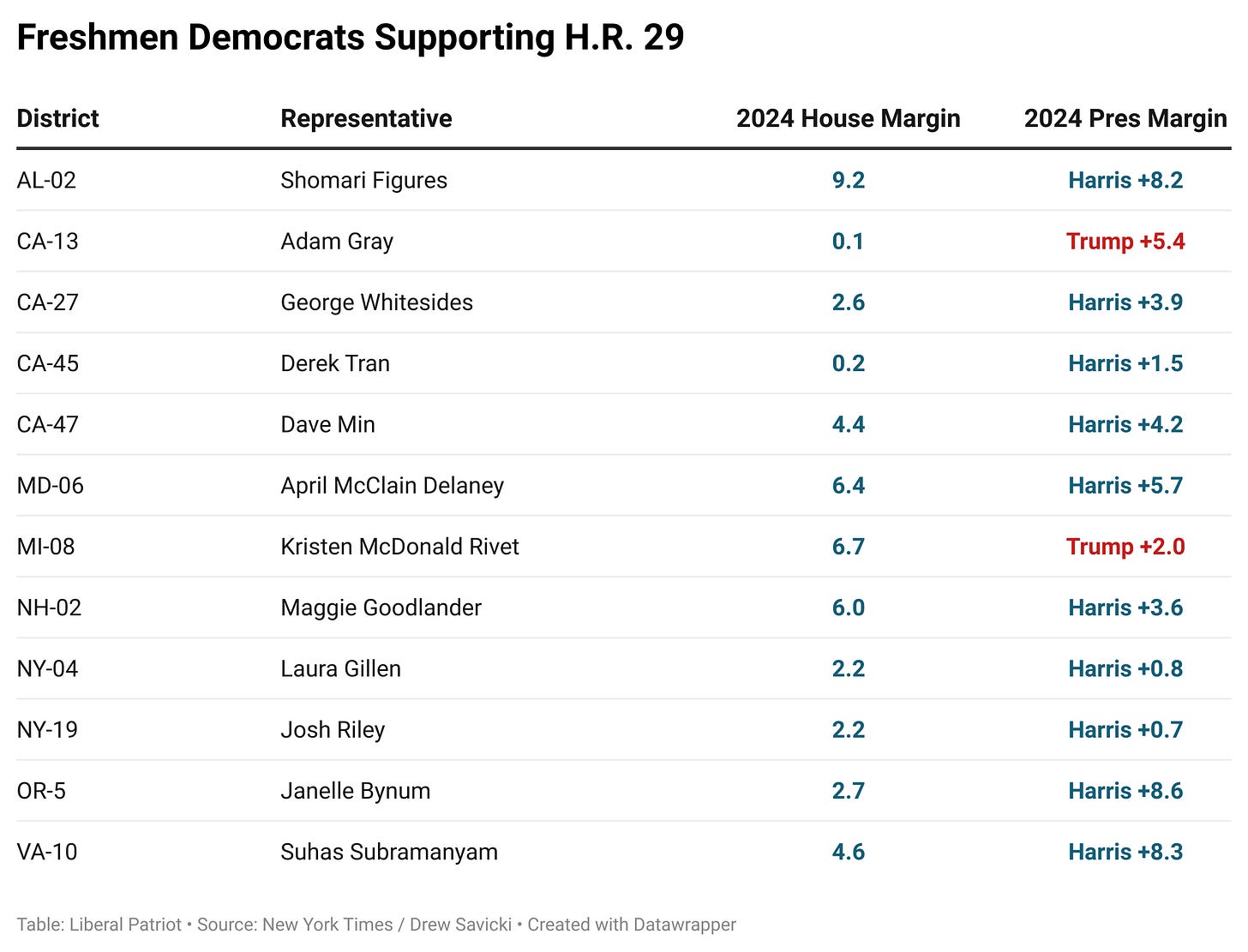A New Year’s Reality Check for Democrats
Vulnerable Democrats tack right on immigration.
Item number one for Mike Johnson and the GOP in 2025? A vote on the Laken Riley Act—an illegal immigration crackdown that would require Homeland Security to detain migrants arrested for burglary, theft, or shoplifting. The quick move from the newly (and narrowly) re-elected Speaker was no surprise. Voters handed the GOP unified control of the federal government in no small part because of their promise to control illegal immigration. And unsurprisingly, the bill received unanimous support from House Republicans—an easy win on an important issue.
More interesting is the fact that the bill was quite bipartisan. Forty-eight House Democrats crossed the aisle and voted for the bill. The overwhelming majority of Senate Democrats voted for cloture and Senators Ruben Gallego and John Fetterman even co-sponsored the bill.
Policy implications aside—and Democrats do have legitimate complaints about the bill’s content (namely protections for Dreamers)—voting for the bill was likely a smart political move. In November, three in four voters cited “the situation at the US-Mexico border” as an important factor in their presidential choice. These voters backed Trump by 24 points. Nearly a third of the electorate cited it as the single most important factor in their vote. These voters backed Trump by a staggering 63 points. For better or worse, Americans are demanding changes to immigration policy and Democrats must respond.
The House Democrats most likely to join their GOP colleagues? Those bound for tough races in 2026. Forty-one of the 48 “defectors” represent districts that voted for Harris by less than ten points. All but two Trump-district Democrats supported the bill (Nellie Pou and Gabe Vasquez were the holdouts). Also among the “yeas” are the strongest performing Democrats—members like Jared Golden, Marie Gluesenkamp Perez, Frank Mrvan, and Marcy Kaptur. Time and time again they’ve shown that beating the presidential baseline requires bucking the party line on losing issues.
Democrats first elected in 2024 also appeared more willing to cross the aisle. Forty percent of freshmen, but 22 percent of House Democrats overall, supported the bill. Some of this discrepancy is because freshmen are more likely to come from competitive districts. But it is also a sign that Democrats who were first elected in November are taking the public’s shift on immigration seriously. Tough talk helped them win, but tough votes will be what keep them in office. Early indications are that this year’s freshman class is trying hard to stick around.
One of the many demographic aphorisms that crumbled in November was that Latinos simply vote for the party with a more liberal immigration platform. As this excellent Atlantic piece noted, Democrats had long conflated the views of “highly educated, progressive Latinos” who staff immigration-advocacy nonprofits with those of actual Latino voters. This week’s vote suggests congressional Democrats are finally recognizing the difference between the two. The Rio Grande Valley's Vicente Gonzalez and Henry Cuellar backed the bill. So did Adam Gray, Jim Costa, and George Whitesides—all of whom represent heavily Latino districts in California.
Tucked away amongst the frontliners and freshmen were two Democrats from deep-blue districts that nevertheless backed the bill: Georgia’s Lucy McBath and New York’s Ritchie Torres. Neither will face a tough GOP challenger, so why the sharp tack to the center? I’d wager both Torres and McBath are seriously eyeing their respective governor’s mansions in 2026. Torres seems eager to primary Kathy Hochul, an unpopular incumbent, and McBath would vie for the seat left open by a term-limited Brian Kemp. Both are worth keeping an eye on in 2025—expect each to back a fair number of GOP messaging bills in the months to come.
Stepping back for a second, it is remarkable that an immigration bill this conservative attracted so many Democratic votes. Just five years ago nearly all the Democratic presidential candidates said they would decriminalize illegal border crossings! Much of 2019 and early 2020 was spent scrambling to stake out the furthest left position on immigration—a race encouraged by the groups Ross Barkan has cleverly labeled “The Alphabet Left.” Rather than a traditional pivot to the center after winning the 2020 primary, Biden actually moved to the left to appease Sanders supporters. Four years later, these decisions came home to roost. Now Democrats are playing catch-up, backed into a corner by GOP legislation.
How quickly things change.







It’s still not clear to me (a Democrat) exactly why the Biden administration decided that it was a good idea to open our borders to millions of unskilled, uneducated people. Allowing a relative small number of the well educated in each year is probability a good idea. This was one of the most disastrous policies the country has seen in my long lifetime and I hope that our representatives in the new Congress will grill those responsible to determine its origin. It undermined the wages of all workers and exacerbated our national housing crisis when we can’t house our own citizens. It was a major factor in the election of Donald Trump. It consumed billions of our tax dollars which could have been put to better use. I still don’t understand those who say that we should not deport the majority of these interlopers. They violated our laws and continue to violate them and they should be removed not rewarded by allowing them to stay. There’s no statute of limitations on this illegal behavior. No one believes that they have a right to move to Paris and live their life there without the permission of the French and no one would argue that the French have no right to kick their sorry asses out of that country. Why do the same rules not apply to the United States? They clearly do.
This is the first common-sense step Democrats have taken in five years. Their problem remains, however, not congresscritters but big city mayors who are completely unrepentant.